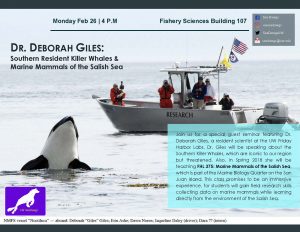Summer job: Fishery Field Crew, Sitka Sound Science Center
The Sitka Sound Science Center is advertising for field crew for a summer fishery field project. The job involves daily sampling of post-spawning chum salmon in four streams in the Northern Southeast area. This work involves remote stream work under a variety of conditions sampling post-spawning chum salmon for otoliths, tissue samples, and scales. Successful applicants will be well suited for working and living in a small group environment. The work entails extensive time in the field under challenging conditions (rain, bears, bugs), weekend work, and, may involve living on-board a chartered support vessel. The project has the potential to be funded each summer through 2019. Hiring is dependent on grant funding.
Read moreCoastal Resource Specialist, WA Department of Ecology (Mount Vernon, WA)

Protecting Washington State’s environment for current and future generations is what we do every day at Ecology. If you want to join a highly effective, collaborative team in exciting work dedicated to managing a sustainable water supply in Central Washington, this may be the position for you.
The Shorelands and Environmental Assistance (SEA) program within the Department of Ecology is looking to fill Coastal Resource Specialist (Environmental Specialist 3) position. This position will be located in our Padilla Bay Office in Mount Vernon, WA.
This position uses scientific principles in planning and implementing natural resource management, research, protection and enhancement for Padilla Bay National Estuarine Research Reserve (PBNERR), monitoring and maintaining the Reserve’s resource base, and interacting with Ecology and other local, state, federal and tribal entities on natural resource issues, including NOAA/NOS/OCM. The Coastal Resource Specialist position also serves on various advisory committees regionally and statewide.
Read more[student job]: College of the Env. Career Services and Academic Affairs Program Assistant

The College of the Environment Academic Affairs Office is hiring a part-time (10-15 hours/week) student assistant to manage the career opportunities page, assist with coordinating the Undergraduate Student Ambassador Program, and assist with the management, planning and execution of events throughout the school year. This position is open to current UW undergraduate students only. Applications are due by May 11, 2018
Read moreProgram on Climate Change Annual Spring Symposium

The Program in Climate Change (PCC) invites you to attend our second annual Spring Symposium on Saturday, May 12 from 9 am to 3 pm (rescheduled from April 7) in the Fishery Sciences (FSH) building. This event features interdisciplinary presentations on climate- and earth-science-related research, outreach, and education by students and postdoctoral researchers from all around campus. Catered lunch will be provided.
Read moreBermuda Institute of Ocean Sciences summer courses

Each summer, BIOS offers a suite of courses for both undergraduate and graduate students that capitalizes upon the expertise of our faculty and visiting scientists. These courses, listed below, provide many students the opportunity to study topics in marine science that might not be offered within the curricula of their home institutions. Each course comprises lectures, laboratory exercises, and complementary field components that build upon what is learned in the classroom. Partial scholarships may be available to all students.
Read moreSAFS Bevan Series Guest Lecture: “Stories and Sense-Making – How Human Minds Fish for Meaning”, Liz Neeley, The Story Collider

Liz Neeley is the Executive Director of The Story Collider. In live shows across the country, a weekly podcast, and intensive workshops, The Story Collider is dedicated to producing true, personal stories about science. After a decade of work in ocean conservation and science communication, Liz wanted to more deeply explore the performance and substance of narratives. From 2008 to 2015, she worked as the Assistant Director of Science Outreach for COMPASS, and was affiliate staff at The University of Washington during that time. Before that, she worked on locally-managed marine conservation in Fiji and Papua New Guinea, and on international trade policies for deep-sea corals.
Read more[job]: Eelgrass Monitoring Technician, WA Dept. of Natural Resources (Olympia, WA)

This position works among a team of scientists to assess the status and trends of marine and estuarine resources in Washington State. The Nearshore Habitat Program inventories and monitors intertidal and shallow subtidal areas for a wide range of management and scientific purposes.
Read more[course]: BIOL 240: new option for intensive, first-year general biology in summer term

BIOL 240 is a 15 credit Summer course that can be taken as an alternative to the three-quarter BIOL 180-200-220 Introductory Biology Series. It will be an exciting and high intensity, full-time academic commitment. Intended for, but not limited to, students interested in health professions.
Read more[course]: OCEAN 497C: Oceanography in the Service of Society

This course will train students in application of key ideas and principles from Oceanography to address immediate societal needs in education, human health and aquaculture. Course content is designed to provide core knowledge, practical skills and real-world experience in Earth Sciences pedagogy and environmental monitoring. This content is relevant to students aspiring to be skilled educators at the K-12 through University levels; to gain qualifications for a wide variety of jobs in environmental consulting, marine industries, or technology; or to be basic researchers in Oceanography with improved insight into applications of their work.
Read moreSea Dawgs club guest lecture: Southern Resident Killer Whales & Marine Mammals of the Salish Sea

Join Dr. Deborah Giles (instructor of the spring 2018 FHL 375: Marine Mammals of the Salish Sea course) for a guest lecture hosted by the Sea Dawgs student club.
Read more